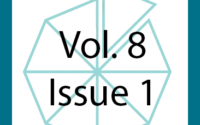A Rhetoric of 心 (Heart) and Liberal Democracy
In the study of Chinese rhetoric, the word 心 (xīn), commonly translated as “heart,” has often been used as a kind of foil to Western rhetorics (Garrett 1993). In Artistotle’s Rhetoric, one’s heart is the emotional center of an individual. If one decides with one’s heart, it means making a decision with emotion. In contemporary English, letting your heart “speak” is to let emotion, whatever that is, dominate your thoughts. Thus, thoughts are not emotions but a something else that usually originates in the brain or, more abstractly, the mind. This division of emotion from logic is the bedrock that the reason-based dialectics of U.S. political systems are presumed to rest upon. For rhetoric, a rational mind creates abstract thoughts that are then translated into language for the purposes of communication, deliberation, and governance. Whereas emotion, or the heart, is part of the body mass, a thing unknowable and uncontrollable except by those who are strong enough to marshal their irrational desires à la the charioteer in Plato’s Phaedrus.
Yet, 心 in classical Chinese thought is where both the emotions and the mind are located. In this rhetoric, thinking is not necessarily separated from feeling. 心 feels and thinks (Yu 2009). That is not to say that mind/body separations are not also achieved in these rhetorics (see Slingerland, 2017) but that the distinction between thought and feeling are not as essentially demarcated as they are in Western rhetorical traditions, where scholars from John Locke to Lloyd Bitzer have implicitly or explicitly cordoned off the mind from the body. In this essay, I will argue that a rhetoric of 心 challenges the epistemological divides present in American and, more broadly, Western Liberal Democracies and can also be seen at work in the recent emergence of American identity politics. Further, a rhetoric of 心 can be used to understand left/right political spectrums as well as offer novel solutions towards the ends of resolving conflicts between the extreme ends of these spectrums and the political center.
1.
Rhetoric’s central role in the construction of truth has moved from the remote province of post-modern theorists to a mainstream past-time that plays out in op-ed pieces, social media feeds, and electoral politics. While there are many theorists who could be referenced in relation to the phenomenon, including Lyotard, Althusser, and Foucault, Derrida’s formulation that a given truth arises from our subjective interaction with a given moment is useful in this instance– that our descriptions of an object are “contaminated” by the subject’s “desire” (Spivak lix). These arguments for the socially constructed nature of truth has resulted in an increasing lack of publicly agreed upon objective reality. In the era of internet supremacy, where every citizen is entitled to their own individually catered media-landscape, the social-constructionist view reigns supreme and conflict abounds. Be it disagreement about the existence of climate change, Russian interference in American elections, or flat-earth conspiracy truthers, the province of empirically proven fact has ceded ground to the contaminated identity formations from which our arguments spring. And though one can see these disagreements through the lens of right/left American politics, it is also possible to read these disagreements though the concept of 心: that there is one side dedicated to the province of objective facts and that there is one side that believes that facts and feelings are inseparable. The claim here that I wish to unpack in this section is that these sides are not divided along political lines but into epistemological camps.
Take for example the phenomenon of the public intellectual Jordan Peterson, a clinical psychologist and academic who, beginning in the Spring of 2018, began to receive attention from the mainstream media. The phenomenon of his popularity has spawned different takes on his appeal. The dominant one is that people, mostly young men, are attracted to his bootstrapping message, where Peterson provides individuals with a way to be in the world, an “antidote to chaos” that pegs “neomarxist” identity politics and “post-modern” theory as problems for the Western world. Specifically, Peterson has argued that “political correctness” sometimes goes too far such that free speech in academia and North American society at large is regulated to a harmful degree (Burston 2019). This argument suggests that in some contexts, such as the contemporary college classroom, one cannot say, “I don’t believe in white privilege” without being accused of being a racist. Peterson is not alone in problematizing political correctness and further linking its rise to an identity politics where tribalism trumps argument. Other prominent public intellectuals such as Francis Fukayama (2018) and Amy Chua (2019) have made similar arguments, painting a slippery slope between the policing of language and an un-democratic factionalism. Just as extreme right-wing identity politics (e.g., white nationalism) is harmful and destructive, extreme left-wing identity politics (e.g., accusations that an individual is sympathetic to or aligned with unsavory ideologies) is also harmful and destructive. Peterson’s appeal is indicative of an emerging topoi in public discourse, one where identity politics and political correctness is regarded as an existential threat to liberal democracy.
The point of discussing Peterson’s views is not about the province of free speech or if political correctness has gone too far. The point is that a public discourse built on modern conceptions of dialectic is challenged when particular kinds of claims are disallowed because they align with suspect ideologies. On the political right Trump continues to deride the media, claiming that all but Fox News are liars not to be trusted. Fake news, alternative facts, and a polarized public have helped to mainstream the belief that truth is contaminated by a subject’s desire. Cynics like Trump have taken this idea to mean that there is no common ground for us to stand on. At the same time, as Peterson’s argument makes, there is also a contingent of this argument on the political left: that the systems of governance upon which liberal democracies were built are contaminated by the conscious and unconscious biases of its founders. Because women, minorities, people of color were shut out, for the most part, of politics and power for much of the history of the West, the game has been rigged and therefore the hierarchies (political, economic, juridical, military, racial, sexual) that have held these power relationships in place need to be radically reformed. And though this long overdue critique isn’t a challenge to the “facts” of science or journalistic standards, it is a challenge to the idea that logocentric deliberation will lead to justice.
If taken at face value, the claim that speech in the U.S. within academia and social media is increasingly being policed is similar to the ways that speech is policed in China. By this I don’t mean in a “big brother” kind of way such that there is a central authority enforcing a top-down regulation of speech. Instead, I mean speech is regulated because ideas are not harmless abstractions, but that speech and the ideas communicated through speech can do real harm: that there is such a thing as ideas that are good for us and ideas that are not. Therefore, the ideas that are not good for us should be removed from the public sphere. There is not a right/left divide in terms of who has been willing to adopt this argument but a modern/post-modern divide. On one side there are those who believe in the institutions of liberal democracy, including dialectic, and, on the other, a deep and influential skepticism in regard to the machinations of liberal democracy. Both the political left and right are themselves divided between these poles.
2.
The concept of 心 provides insight on our seemingly intractable political divides by offering an alternative to political left/right spectrums. Instead of politics, these divides can be understood in terms of epistemology and what counts as truth. It is cliché to say that there is no difference between Democrats and Republicans (a cliché that unfortunately holds a powerful sway in drawing voters to the polls), but there is truth to this claim if one judges the difference not on their voting records but on how they go about making and implementing decisions: boardroom style, corporate, and dependent on election cycles. Tradition, campaign dollars, and poll numbers are what fuel their truth claims. Simultaneously, there are coalitions on both the right and the left that are deeply unsatisfied with the status quo. The Occupy movement and the popularity of Bernie Sanders are examples of what would typically be called left-wing “populist” movements. The proto-Trump Tea Party could be said to be the right-wing version.1 The strength of these movements comes from their spontaneity, flexibility, and connections made possible through social media (Agarwal et al. 2014). The rhetoric of 心 plays out on both the left and the right in that the province of truth as objective fact has come under fire as post-modern theories and their social-constructivist offspring has become mainstream, be it on the science-adverse right or the hierarchy-adverse left.
To be clear, in no way am I arguing that the means or ends of Bernie Sanders and Donald Trump are equivalent to each other. Nor am I arguing that the rhetoric of traditional left/right spectrums is not still at work. What I am arguing, however, is that a rhetoric of 心 challenges the epistemological divide between logic and emotion, and thus poses an alternative to the modern epistemologies of liberal democracy. The core of American governance is a society governed by laws that above all else ensure the rights of individuals. Those on the contemporary right subscribe to a personal sense of freedom (the boot-strap argument), and those on the left subscribe to social freedoms, e.g., support systems (including education, health care, equal opportunity, etc.). On either side, the basis of truth from which traditional left/right spectrums emerge is one that privileges the dialectic; the idea that competing claims and the reasons to back them up is what makes our political systems go. If anything has been made clear by the insights of the post-moderns and recent American political strife, it is that there is more to rhetoric than disembodied facts and, further, that power manifests through the materials of the world, including the material embodiment of our identities. An increasingly prevalent rhetoric of 心, that there are no thoughts without attendant feelings, opens the door for a reconsideration of core Western values predicated on disembodied dialectics. This rhetoric, however, is not solely at work in the populist movements described above but increasingly within the political mainstream. Executive orders, such that recent presidents from G.W. Bush, to Obama, and now to Trump, have been increasingly used to bypass the, seemingly, oppositional forces of the Congress and Senate (Kaufman and Rogowski 2018). For recent American presidents, getting any law passed requires the circumvention of traditional legislative means, and, thus, the moral imperative of “doing the right thing” requires that conventional political hierarchies be side-stepped.
Jordan Peterson and other’s arguments against political correctness can be read as a reaction against a rhetoric of 心 and its existential threat to liberal democracy as we’ve known it. Peterson’s emphasis on Christian values2 and his background as a successful academic are not incidental but core to the rhetorics of modernism, rhetorics that maintain a divide between mind dominated thoughts and body dominated emotion. What good then might come from a rhetoric of 心? What does this available means of persuasion allow us to see that has been previously hidden? First, it suggests that there are new coalitions to be forged, coalitions that bypass traditional left/right binaries. Alexandria Ocasio-Cortez’s recent agreement to work with Ted Cruz on a lobbying-ban for former members of Congress (West 2019) and Pete Buttigieg’s challenge to the Christian right on the moral authority of Evangelical Christians (Peters 2019) are two recent examples of novel political developments. Together they suggest an alternative way forward for American politics, a way that privileges moral imperatives over dialectical machinations. Thus, a rhetoric of 心 points at potential coalitions between groups who have, at least along a left/right spectrum, set themselves up and been set up by the media as mortal enemies. Secondly, then, this rhetoric frees us from the narratives of discord that the media continually stokes and that predispose Americans to distrust. I see no reason to explain this in more detail, exhausted as we already are.
Finally, a rhetoric of 心 suggests that acknowledging the “emotional” dimensions in secular liberal democracy are key to preserving its most fundamental aspects. If personal freedom is the core of what liberal democracy promotes, it is essential to understand that this right also springs from an epistemological base that both conceals and reveals ways of being the world. What then are the attendant feelings and emotions that attach themselves to these freedoms? When we speak about the rights for students to own their language, the right to inclusive classrooms, or the right to opportunities at large in our society, let us begin to articulate not just the idea but the ways one is to feel about these rights. Only then might our arguments for the common good reveal themselves in novel and constructive ways.
End Notes
- There are, however, major differences between their forms of populism. For example, see Laschever 2017 for a discussion of how Tea Party blogs tend to be subsumed by mainstream Republican interests. return
- However, some may have issue with Peterson’s somewhat perennialist take on these values, i.e., that growing up in the Judeo-Christian culture of the West necessarily instills Christian values in all. See Peterson discussing Christian belief and values at https://www.youtube.com/watch?v=xrBDSrFDGAk. return
Works Cited
Agarwal, Sheetal D., et al. “Grassroots Organizing in the Digital Age: Considering Values and Technology in Tea Party and Occupy Wall Street.” Information, Communication & Society, vol. 17, no. 3, 2014, pp. 326-341.
Burston, Daniel. “It’s Hip to be Square! The Myths of Jordan Peterson.” Psychotherapy and Politics International, vol. 17, no. 1, 2019, e1475.
Chua, Amy. Political tribes: Group instinct and the fate of nations. Penguin Books, 2019.
Derrida, Jacques, and Gayatri Chakravorty Spivak. Of Grammatology. Johns Hopkins UP, 1984.
Fukuyama, Francis. “Against Identity Politics: The New Tribalism and the Crisis of Democracy.” Foreign Affairs, vol. 97, no. 5, 2018, 90-115.
Garrett, Mary M. “Pathos Reconsidered from the Perspective of Classical Chinese Rhetorical Theories.” Quarterly Journal of Speech, vol. 79, no. 1, 1993, pp. 19-39.
“Jordan Peterson explains his Christian beliefs.” YouTube, uploaded by Unbelievable?, 8 June 2018, https://www.youtube.com/watch?v=xrBDSrFDGAk
Kaufman, Aaron R., and Jon C. Rogowski. The Unilateral Presidency, 1933–2017. Working Paper, 2018.
Laschever, Eulalie. “Are They Not Worthy? How Partisan Political Blogs Legitimize the Tea Party Movement and Occupy Wall Street.” Sociological Forum, vol. 32, no. 2, 2017, pp. 359-380.
Peters, Jeremy W. “Gay and Christian, a 2020 Contender Challenges the Religious Right.” The New York Times, 10 Apr. 2019, p. A14.
Slingerland, Edward. “China as the Radical ‘Other’: Lessons for the Cognitive Science of Religion.” Religious Cognition in China: “Homo Religiosus” and the Dragon, edited by Hornbeck, Ryan G., Justin L. Barrett, and Madeleine Kang, Springer, 2017, pp. 57-76.
West, Geoff. “Cruz, Ocasio-Cortez still discussing revolving door bill.” The Fulcrum, 15 Aug. 2019, https://thefulcrum.us/congress/cruz-aoc-lobbying-ban. Accessed 8 Jan 2020.
Yu, Ning. The Chinese HEART in a Cognitive Perspective: Culture, Body, and Language. Vol. 12. Walter de Gruyter, 2009.
KEYWORDS: Comparative Rhetoric, China, Liberal Democracy, Jordan Peterson, Ocasio-Cortez, Trump
COVER IMAGE CREDIT: “Light painting” by crmc1001 is licensed under CC BY-NC-SA 2.0




 Tyler Carter is an Assistant Professor of Writing and Rhetoric at Duke Kunshan University in Kunshan, China. He is interested in how rhetoric across varied cultural contexts affect perception, writing, and teaching. The blog from which a primordial version of this essay first appeared can be found at foreignology.blogspot.com.
Tyler Carter is an Assistant Professor of Writing and Rhetoric at Duke Kunshan University in Kunshan, China. He is interested in how rhetoric across varied cultural contexts affect perception, writing, and teaching. The blog from which a primordial version of this essay first appeared can be found at foreignology.blogspot.com.